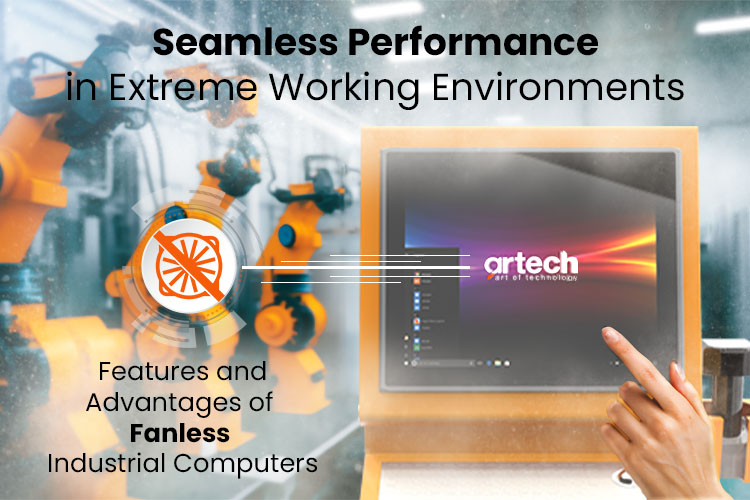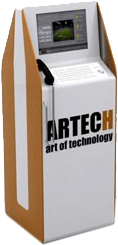Seamless Performance in Extreme Working Environments- Features and Advantages of Fanless Industrial Computers

Industrial sectors must ensure continuous productivity and reliability even under extreme operating conditions. Therefore, fanless industrial computers offer a durable and reliable solution instead of computers with fans. In this article, we will discuss in detail the importance of fanless industrial computers that meet the needs of the industrial sector.
Needs of Industrial Sectors
Industrial sectors operate in many fields, from production lines to automation systems, energy management, and data collection. Among the needs of businesses in these sectors, high durability, longevity, low risk of failure, and reliability are at the forefront. In addition, factors such as harsh working conditions, vibration, dust, humidity, and high temperature are also factors to be considered.
Definition of Fanless Industrial Computers
Fanless industrial computers are computer systems specially designed for use in industrial sectors. These computers use unique technologies to provide thermal management without fans. Compared to systems with fans, it offers advantages such as quiet operation, low energy consumption and less risk of failure.
Fanless Computers Sustainability
Fanless computers offer significant advantages in terms of sustainability. Passive cooling methods reduce energy consumption and eliminate the energy required by fan systems. This saves energy and reduces environmental impact. In addition, the longer life and less maintenance required by fanless systems also contribute to sustainability goals by reducing waste.
Technical Aspects of Fanless Industrial Computers
- Thermal Management: Fanless PCs use various technologies to optimise their thermal performance without fans. Components such as passive heat spreaders, specialised cooling systems and thermal sensors effectively dissipate heat, keeping the computer's temperature low. This ensures stable component operation and reduces the risk of failure.
- Component Selection: Fanless PCs are equipped with specially selected components to ensure reliability and performance in industrial environments. These components can operate in wide temperature ranges. They also resist ambient conditions such as vibration, dust and humidity. Specially designed components such as motherboards, processors, memories and storage units enable fanless computers to perform highly in industrial environments.
- Temperature Tolerance: Fanless computers have a wide temperature tolerance to cope with the temperature fluctuations of industrial sectors. In particular, it ensures the stable operation of components even in high-temperature environments. This feature enables fanless computers to maintain their reliability in application areas that are not temperature controlled or where there are extreme temperature variations.
- Advanced Connectivity Options: Fanless industrial computers offer a wide range of connectivity options to meet the requirements of industrial applications. For example, features such as various USB ports, serial ports, Ethernet connectivity and expansion slots facilitate integration with external devices and support data communication.
These technical features make fanless PCs an ideal choice to ensure durability, reliability and performance in industrial sectors. These computers can operate stably even under harsh conditions, ensuring continuous productivity.
Fanless Industrial Computers in Harsh Operating Conditions
Fanless PCs perform well in harsh operating conditions because they provide thermal management without fans. This makes them more resistant to dust, humidity, vibration and vibration and ensures the stable operation of components. For example, a machinery manufacturer can use fanless industrial computers in harsh environments such as in-vehicle vibration, dust and impact and reliably perform tasks such as data acquisition, process control and monitoring.
Comparison of Fanless and Fan Systems
A comparison between fanless industrial computers and fan systems is essential to understand which solution suits a specific industrial application or environment. Let's compare some critical features of fanless and fan systems:
- Reliability: Fanless computers are more reliable than fan systems because the fans do not contain mechanical parts. Fans can wear out, and fan bearings or motors fail over time. Fanless computers eliminate this risk of fan failure; this allows systems to operate for more extended periods without failure and improves business continuity.
- Low Noise Level: The noise fans produce during the operation of fan systems can create discomfort in the working environment. Fanless computers offer quiet operation because they do not need fans. This feature is a preferred advantage, especially in sensitive work areas such as laboratories, studios or office environments that require quiet operation.
- Less Maintenance: Fans can accumulate dust and dirt over time and may need to be cleaned regularly. In addition, fans can cause failures in components such as fan bearings or fan motors. Fanless computers eliminate this maintenance requirement and reduce maintenance costs and time loss. Users do not have to deal with routine maintenance such as cleaning or replacing fans.
- Energy Efficiency: Fans are an essential source of energy consumption in computer systems. Fanless computers provide lower energy consumption because they do not need fans. This reduces energy costs and makes systems more environmentally friendly. Also, with less energy consumption, less heat is generated, which makes thermal management easier.
- Durability: In fan systems, fans can be affected by vibration or impact and have delicate mechanical parts. Fanless computers are more durable because they do not contain mechanical parts. Especially in industrial environments, vibrating or moving applications or portable systems, the risk of failure of fans is higher. Since fanless computers have a durable structure, they can better adapt to such harsh conditions and last longer.
- Thermal Performance: Fanless PCs effectively dissipate heat using special thermal management techniques and passive cooling technologies, allowing components to operate at optimal temperatures. Whereas fans in fan systems remove heat by circulating air, fanless PCs optimise thermal management with components such as thermal sensors and heat spreaders. This allows components to operate more stably and reliably, reducing the risk of overheating and improving system performance.
- Longevity: Fanless PCs tend to last longer than those with fans. In systems with fans, fans are more likely to wear out and fail over time, and fanless systems can run smoothly for longer because they do not contain a mechanical part.
Application Areas of Fanless Industrial Computers
- Factory Automation: Factory automation is one of the industrial sector's most widely used areas of fanless computers. These computers automatically control production lines and perform data collection and monitoring tasks. Resistant to ambient conditions such as vibration, dust and humidity, fanless computers can operate reliably in factories and increase productivity.
- Logistics and Storage: Fanless computers also play an essential role in the logistics and warehousing industry. These computers perform tasks such as inventory management, material tracking, shipment tracking and data collection. Thanks to their ability to withstand harsh environmental conditions, they can be used reliably in storage areas, cold storage and transport vehicles.
- Construction Machinery Control Systems: In the construction equipment manufacturing industry, fanless industrial computers play an essential role in the control systems of construction equipment. These computers control the movement, operations and functionality of construction machines. They also process incoming data through sensors and ensure construction machinery's safe and efficient operation. They can also offer reliability, durability and performance benefits in various application scenarios, such as display and control panels, data logging and analysis, safety and telematics systems, improving the productivity of construction equipment and keeping operations running smoothly.
- Transport and Mobility: Fanless computers are also widely used in the transport and transport industry. These computers are used for vehicle monitoring systems, logistics management, passenger information systems and transport planning. Fanless computers provide reliable data collection and vehicle communication and are resistant to vibration, shock and changing weather conditions.
- Energy Sector: In the energy sector, fanless computers are used for energy generation, distribution and management. Fanless computers can operate continuously and reliably in power stations, wind power plants, solar energy, and intelligent grid systems. It also plays a vital role in the energy sector's electronic control systems and data acquisition applications.
ARTECH Fanless Industrial Computers
ARTECH provides durability, reliability and performance advantages by offering fanless industrial computers for industrial sectors. Our fanless Industrial PCs, which we have developed to provide reliability, longevity and high performance even in harsh operating conditions, are equipped with industrial-grade SSDs. SSDs make our systems more reliable and faster thanks to their faster data transfer speeds than traditional hard drives and no moving parts.
ARTECH Fanless Industrial PCs are designed in a closed and robust way using industrial parts. In this way, we minimise situations such as replacing parts that require maintenance and dealing with malfunctions. Our computers, which require less maintenance than fan systems, provide reliable and optimal performance even in extremely cold or hot environments thanks to durable internal components. Our computers have a thermal design that absorbs heat from internal components and dissipates it through aluminium blocks with passive cooling.
ARTECH's fanless industrial computers also stand out with their durable outer cases. Our outer shells have heat-absorbing and dissipating properties made of aluminium and are used to remove heat from internal components effectively. In this way, our computers are designed to be both durable and effective in heat management.
ARTECH fanless industrial computers are also resistant to frequent shocks and vibrations. Tested following MIL-STD 810 standard, our systems withstand up to 50G shock and 5 GRMs vibration. Removing all cables from the system makes our computers more resistant to vibrations and shocks and prevents connection loosening.
ARTECH fanless industrial computers are ideal for businesses looking for durability, reliability and performance in industrial sectors. They stand out because they can cope with environmental factors such as high temperature, dust, humidity and vibration. In addition, they provide energy savings thanks to their silent operation and energy efficiency. ARTECH provides reliability and durability by offering our customers fanless industrial computers designed and manufactured specifically for sectoral needs.



 English
English
 TR
TR